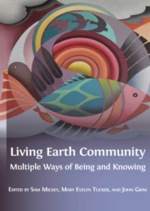 Living Earth Community: Multiple Ways of Being and Knowing
Living Earth Community: Multiple Ways of Being and Knowing
With Sam Mickey and Mary Evelyn Tucker
Open Book Publishers, 2020
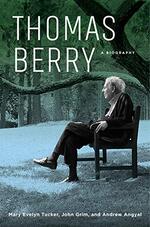 Thomas Berry: A Biography
Thomas Berry: A Biography
With Mary Evelyn Tucker and Andrew Angyal
Columbia University Press, 2019
Thomas Berry (1914–2009) was one of the twentieth century’s most prescient and profound thinkers. As a cultural historian, he sought a broader perspective on humanity’s relationship to the earth in order to respond to the ecological and social challenges of our times. This first biography of Berry illuminates his remarkable vision and its continuing relevance for achieving transformative social change and environmental renewal. Berry began his studies in Western history and religions and then expanded to include Asian and indigenous religions, which he taught at Fordham University, Barnard College, and Columbia University. Drawing on his explorations of history, he came to see the evolutionary process as a story that could help restore the continuity of humans with the natural world. Berry urged humans to recognize their place on a planet with complex ecosystems in a vast, evolving universe. He sought to replace the modern alienation from nature with a sense of intimacy and responsibility. Berry called for new forms of ecological education, law, and spirituality, as well as the creation of resilient agricultural systems, bioregions, and ecocities. At a time of growing environmental crisis, this biography shows the ongoing significance of Berry’s conception of human interdependence with the earth as part of the unfolding journey of the universe.
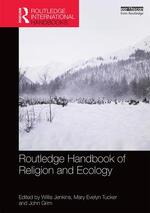 Routledge Handbook on Religion and Ecology
Routledge Handbook on Religion and Ecology
Co-edited with Mary Evelyn Tucker and Willis Jenkins
Routledge Books, 2017
The moral values and interpretive systems of religions are crucially involved in how people imagine the challenges of sustainability and how societies mobilize to enhance ecosystem resilience and human well-being. The Routledge Handbook of Religion and Ecology provides the most comprehensive and authoritative overview of the field. It encourages both appreciative and critical angles regarding religious traditions, communities, attitude, and practices. It presents contrasting ways of thinking about “religion” and about “ecology” and about ways of connecting the two terms. Written by a team of leading international experts, the Handbook discusses dynamics of change within religious traditions as well as their roles in responding to global challenges such as climate change, water, conservation, food and population. It explores the interpretations of indigenous traditions regarding modern environmental problems drawing on such concepts as lifeway and indigenous knowledge. This volume uniquely intersects the field of religion and ecology with new directions within the humanities and the sciences. This interdisciplinary volume is an essential reference for scholars and students across the social sciences and humanities and for all those looking to understand the significance of religion in environmental studies and policy.
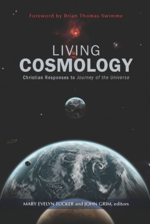 Living Cosmology: Christian Responses to Journey of the Universe
Living Cosmology: Christian Responses to Journey of the Universe
Co-edited with Mary Evelyn Tucker
Orbis Books, 2016
WINNER 2017 CATHOLIC PRESS ASSOCIATION BOOK AWARD–
FIRST PLACE, SCIENCE AND RELIGION
Journey of the Universe is both a book, a film, and a conversation series by Mary Evelyn Tucker and Brian Swimme that offers a rich unfolding of “the universe story”—a moving narrative of cosmic evolution from the origins of the cosmos to the present. This volume explores the Christian responses to the Universe Story and its implications for the contemporary environmental crisis. Beginning with excerpts from recent statements by Pope Francis and the Ecumenical Patriarch Bartholomew, the book draws on the contributions of leading theologians, ethicists, scientists, and activists, including John Haught, Ilia Delio, Catherine Keller, Larry Rasmussen, and more than twenty-five others.
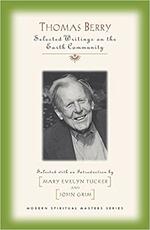 Thomas Berry: Selected Writings on the Earth Community (Spiritual Masters Series)
Thomas Berry: Selected Writings on the Earth Community (Spiritual Masters Series)
Co-edited with Mary Evelyn Tucker
Orbis Books, 2014
Thomas Berry (1914-2009), was a priest, a “geologian,” and a historian of religions. He was an early and significant voice awakening religious sensibilities to the environmental crisis. He is particularly well-known for articulating a “universe story” that explores the world-changing implications of contemporary science. Berry pointed the way to an ecological spirituality attuned to our place in nature and giving rise to an ethic of responsibility and care for the Earth.
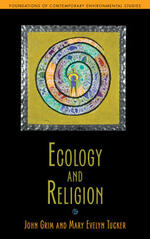 Ecology and Religion
Ecology and Religion
With Mary Evelyn Tucker
Island Press, 2014
From the Psalms in the Bible to the sacred rivers in Hinduism, the natural world has been integral to the world’s religions. John Grim and Mary Evelyn Tucker contend that today’s growing environmental challenges make the relationship ever more vital. This primer explores the history of religious traditions and the environment, illustrating how religious teachings and practices both promoted and at times subverted sustainability. Subsequent chapters examine the emergence of religious ecology, as views of nature changed in religious traditions and the ecological sciences. Yet the authors argue that religion and ecology are not the province of institutions or disciplines alone. They describe four fundamental aspects of religious life: orienting, grounding, nurturing, and transforming. Readers then see how these phenomena are experienced in a Native American religion, Orthodox Christianity, Confucianism, and Hinduism. Ultimately, Grim and Tucker argue that the engagement of religious communities is necessary if humanity is to sustain itself and the planet. Students of environmental ethics, theology and ecology, world religions, and environmental studies will receive a solid grounding in the burgeoning field of religious ecology.
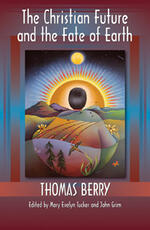 Christian Future and the Fate of Earth
Christian Future and the Fate of Earth
Essays by Thomas Berry, edited by Mary Evelyn Tucker and John Grim
Orbis Books, 2009
Like no other religious thinker, Thomas Berry has been a prophetic voice regarding Earth's destruction and the urgent need for human response from the Christian community. This book collects Berry's signature views on the interrelatedness of both Earth's future and the Christian future. He ponders why Christians have been late in coming to the issue of the environment. He reflects insightfully on how the environment must be seen as a religious issue, not simply a scientific or economic problem. In powerful and poetic language Berry presents a compelling vision of the sacredness of the universe and the interrelatedness of the Earth community. Drawing on Thomas Aquinas and Teilhard de Chardin he brings the Christian tradition into a cosmology of care for the whole of creation.
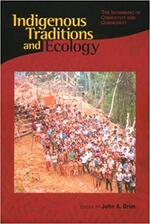 Indigenous Traditions and Ecology: The Interbeing of Cosmology and Community
Indigenous Traditions and Ecology: The Interbeing of Cosmology and Community
Edited by John A. Grim
Center for the Study of World Religions and Harvard University Press, 2001
A new perspective on religions and the environment emerges from this collection. The authors, a diverse group of indigenous and non-native scholars and environmental activists, address compelling and urgent questions facing indigenous communities as they struggle with threats to their own sovereignty, increased market and media globalization, and the conservation of endangered bioregions. Drawing attention to the pressures threatening indigenous peoples and ways of life, this volume describes modes of resistance and regeneration by which communities maintain a spiritual balance with larger cosmological forces while creatively accommodating current environmental, social, economic, and political changes.
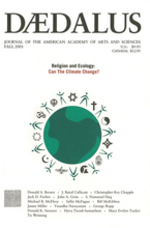 Religion and Ecology: Can the Climate Change?
Religion and Ecology: Can the Climate Change?
Co-edited with Mary Evelyn Tucker
Daedalus. Vol. 130, No. 4,
American Academy of Arts and Sciences, 2001
The fall 2001 issue of the journal Daedalus focuses on interdisciplinary issues regarding religion and ecology that specifically relate to issues raised by global climate change. For more information about the issue and to read the full text of all of the articles contained therein, go to the issue page on the American Academy of Arts and Sciences site.
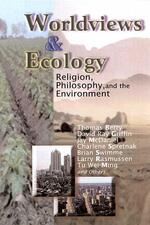 Worldviews and Ecology: Religion, Philosophy and the Environment
Worldviews and Ecology: Religion, Philosophy and the Environment
Co-edited with Mary Evelyn Tucker
Bucknell University Press, 1993
Paperback edition: Orbis Books, 1994 (Eighth printing 2003)
Translated into Indonesian
Amidst the many voices clamoring to interpret the environmental crisis, some of the most important are the voices of religious traditions. Long before modernity's industrialism began the rape of Earth, premodern religious and philosophical traditions mediated to untold generations the wisdom of living as a part of nature. These traditions can illuminate and empower wiser ways of postmodern living. The original writings included in Worldviews and Ecology creatively present and interpret worldviews of major religious and philosophical traditions on how humans can live more sustainably on a fragile planet. Insights from traditions as diverse as Jain, Jewish, ecofeminist, deep ecology, Christian, Hindu, Bahai, and Whiteheadian will interest all who seek an honest analysis of what religious and philosophical traditions have to say to a modernity whose consciousness and conscience seems tragically narrow, the source of attitudes that imperil the biosphere.
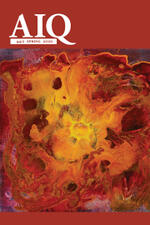 American Indian Quarterly
American Indian Quarterly
Edited by John Grim
University of Nebraska Press
Fall 1992, Volume XVI, Number 4
Special issue on Shamans and Preachers, Color Symbolism and Commercial Evangelism: Reflections on Early Mid-Atlantic Religious Encounter in Light of the Columbian Quincentennial.
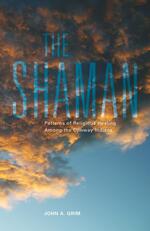 The Shaman: Patterns of Religious Healing Among the Ojibway Indians
The Shaman: Patterns of Religious Healing Among the Ojibway Indians
Originally published as The Shaman: Patterns of Siberian and Ojibway Healing (reissued and renamed in 1987)
University of Oklahoma Press, 1983; paperback, 1984
Civilization of the American Indian Series #165
Translated into French
Tribal peoples believe that the shaman experiences, absorbs, and communicates a special mode of power, sustaining and healing. This book discusses American Indian shamanic traditions, particularly those of the Woodland Ojibway, in terms drawn from the classical shamanism of Siberian peoples. Using a cultural-historical method, John A. Grim describes the spiritual formation of shamans, male and female, and elucidates the special religious experience that they transmit to their tribes. Writing as a historian of religion well acquainted with ethnological materials, Grim identifies four patterns in the shamanic experience: cosmology, tribal sanction, ritual reenactment, and trance experience. Relating those concepts to the Siberian and Ojibway experiences, he draws on mythology, sociology, anthropology, and psychology to paint a picture of shamanism that is both particularized and interpretative. As religious personalities, shamans are important today because of their singular ability to express symbolically the forces that animate the tribal cosmology. Often identifying themselves with primordial earth processes, shamans develop symbol systems drawn from the archetypal earth images that are vital to their psychic healing technique. This particular ability to resonate with the natural world is felt as an important need in our time. Those readers who identify with American Indians as they confront modern technological society will value this introduction to our native shamanic traditions and to the religious experience itself. The author's discussion of Ojibway practices is the most comprehensive short treatment available, written with a fine poetic feeling that reflects the literary expressiveness inherent in American Indian religion and thought.
